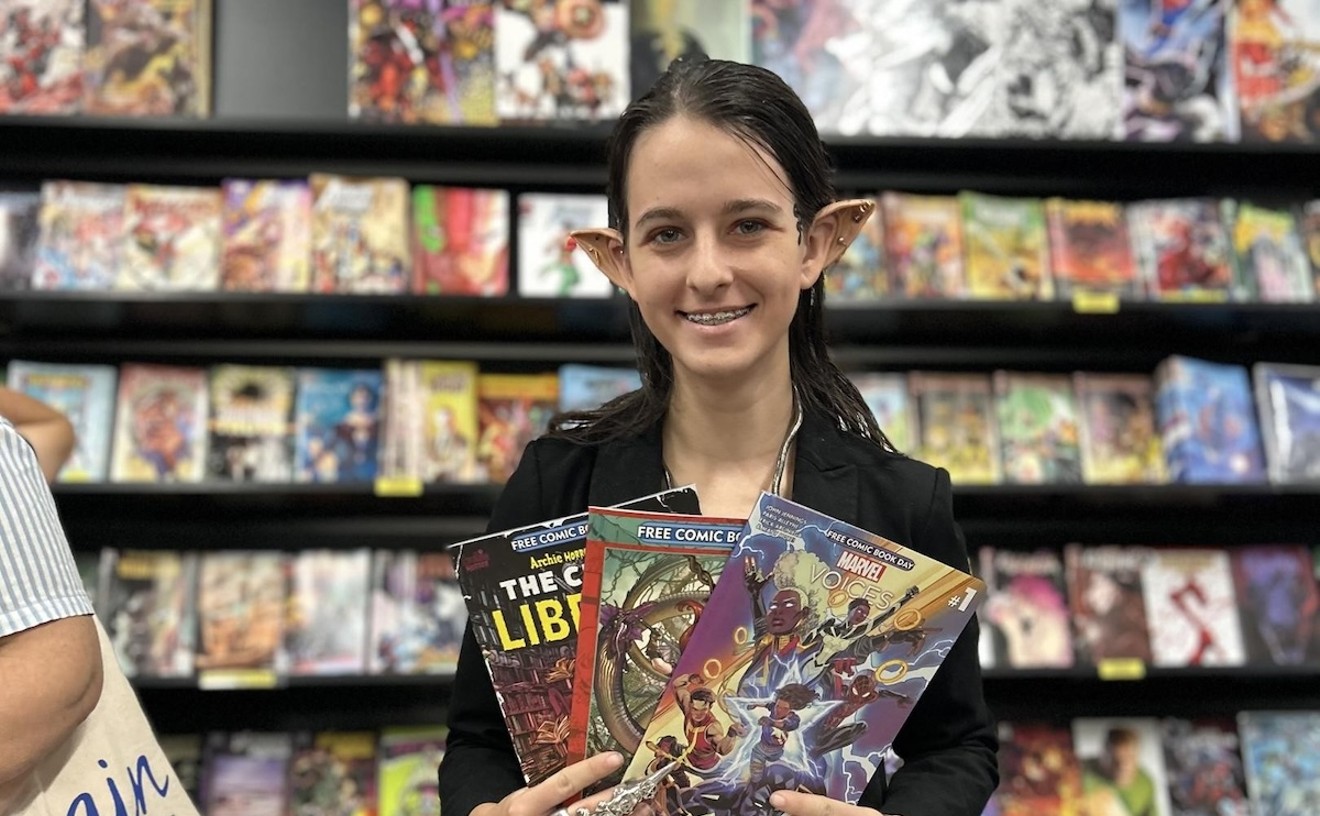Born in Miami, T. Eliott Mansa is a traveler of worlds. Not a jet-setting, train-hopping, vagabond of sorts, but he has lived within multiple realms of reality since childhood in the '80s.
At home, he watched his stepfather struggle with crack addiction, and would later in life battle depression following the death of his mother. Among his peers, he watched many of his friends, even his siblings, succumb to drugs and gang life. At New World School of the Arts, he learned how to paint in order to cope with his surrounding circumstances. Now, all of these experiences have helped him arrive at his latest destination, Yale's prestigious painting MFA program.
Unfortunately, Mansa lost his father to cancer on Easter Sunday, receiving his Yale acceptance letter the night before the funeral. Mansa would again turn to art for deliverance and to make sense of his human relationships.
Opening today at Bas Fisher Invitational (BFI), an artist-run non-profit, is a fundraising exhibition of Mansa's latest work, with all profits directly funding his education. He will display works that bridge the gaps between sociological and autobiographical narratives, mixed with elements of mythologies from West African Yoruba cosmology. Mansa won over this reporter with not only his art, but also his eloquent speech. There is a genuine tone to his thoughts, reflective of his life and persona. New Times asked him a few questions about his upcoming exhibition and the next step in his quest for artistic transcendence.
New Times: What do you feel particularly influences your art?
My family has played a large part in my work. Within the past few years, I realized that I tend to address issues of history, out of the need to create a clearer picture of some of the things I saw as a child. My parents divorced before I was born, and I watched my mother's second marriage end at an early age. I had no idea what drove the split, or what drove my parents apart, so always had the need to reconcile the issues with my past. I only began to deal with familial issues after my mother passed away, but I dealt with the past, history, and socioeconomic issues in my work as a desire to make sense of my world.
You've come from a difficult upbringing, and you've used art as a means to combat it. How did you stay so focused?
I'm not sure if I did remain focused, at least not the whole time. I learned firsthand that there is pressure on young black males to move outside into the margins. 'Normal' seemed to lead to failure, yet the hare seemed to get more praise than the tortoise. No matter how I tried to dabble into the fast life, I was always reminded that there was something different about me. Others recognized it, but I had to learn to value my uniqueness, rather than seek the validation with some form of street cred. I began to see the kind of duplicity that turns friends against each other when fast money and temptation become the norm. When I began seeing my childhood friends begin to die from gun violence, I started to seclude myself in my studio to find my own center, and start over.
How did you decide to apply for the Yale program?
Yale was always the brass ring. As I began to study the histories of some of my favorite contemporary artists who are my age, and come from similar backgrounds, I noticed that many of them are Yale alumni. So much of the art world is waiting for some magical lightning to strike; yet I didn't feel like I could afford to wait for that to happen. I couldn't wait to be 'discovered.' I looked at people who had no small amount of success and decided to follow in their footsteps, to a place where I can push my practice to places I may not have been able to on my own. I tell people that Yale is like the Powerball; you don't actually believe that you will make it in, but it can't hurt to try.
What is the program like?
The program is intense. It is a combination between hours of private studio work, and critiques with faculty, peers, and amazing lectures and studio visits from contemporary artists. I spent a few days sitting in on critiques, exploring the school's art collection, touring the campus. Every part of the environment seems to center on pushing oneself beyond internal comfort zones.
What was it like when you received your letter of acceptance?
When I was accepted, it was a bittersweet moment because it was the night before my father's funeral. My father was aware of my traveling to Yale to interview, but when I got back to Miami, he lost the ability to speak. His cancer seemed to spread over night, and he sort of slipped away from us, as I travelled, interviewing for a few schools, and working on my portfolio up until the last minute. Though my father passed before I got the letter of acceptance, I was thankful to get the news before burying him. It felt to me like, in some strange way, he knew.
You've also incorporated your parents into much of your work; can you talk to me a little bit about that?
Well, my parents were from a different era. Being born this side of integration, I wasn't privy to that world. I was raised on He-Man, Transformers, toys, comic books and Saturday morning cartoons. They kind of kept me in a bubble of safety; yet, as I grew older, I began to see cracks and inconsistencies. I always thought of my dad as the coolest guy on the planet. As a kid, he was the ultimate street guy, but he gave it all up when his mother died. My mother was a schoolteacher, and saw to it that whatever I took an interest in, I was able to explore. She saw to it that I entered magnet programs, and I think that outlet gave me access to a larger world. It showed me that I had options. Being a child of divorce, I had my questions about their stories: questions about my stepfather and his addiction; questions about the contradictions of the neighborhood; shaming the addict; praising the dealer; and the larger society somehow covering all angles. Art became a place where I could ask questions that I never really got answers to at home. It was a place where I mourned my mother's loss and found the closure that I didn't have during her life. It became a place where I came to terms with the relationship between my father and I, during the short time that I had with him.
How did you get started with BFI?
I went to high school with the founders, Naomi [Fisher] and Hernan [Bas]. Naomi has witnessed me struggling to raise money to fly my work up to New Haven to interview at Yale, and was one of the first people to find out that I was accepted. I believe that, knowing me since I was a teenager, and seeing the things she has seen in the art world as an artist, she recognized the great opportunity that I have in front of me and wanted to help me get there.
How did you decide upon your subject matter for this exhibition? West African Yoruba Cosmology and paralleling it to sociological and autobiographical narratives?
I noticed that many artists that deal with figurative images of African Americans, [like] Kehinde Wiley, place them within these stunning Victorian backgrounds as if to elevate their status somehow. Yet, I was troubled by the need to elevate black bodies by placing them in European settings. I felt that paintings like these could end up being more about the lack of brown bodies in the canon of Western Art History, than about the stories of the people captured in the paintings. I thought about the way that we grew up worshipping my father from a distance, and the way urban kids are trained to worship their hustler version of the entrepreneur mastering the free market. We live in an area where many African Americans come from a Protestant tradition that keeps African spirituality at arms reach, while the African traditions brought from the Caribbean, by way of Cuba and Haiti, add a flavor to the city that is undeniable. The Yoruba cosmology contains such a rich canon of myths, legends, and character archetypes, that it is easy to find the humanity in the tales of the gods. I played with the idea of possession and worship. In a way, African spirituality was something to fear, yet we were socialized in ways that, though they are seeped in market driven American dream, drive many young men and women into prison and death. I wanted to tell a distinctly American experience, but through a language that was universal through the myths, names, and personality of the Orishas. I looked at the majority of my siblings and males in my family, being convicted felons, and wanted to picture a kind of possession held onto the mind of these young men. A possession that, rather than being one of an African presence, represents how far we have gotten from ourselves. I wanted to capture the trials that people are facing as something that can be shed, and yet create room for hope; room for finding a Divine Self.
Do you have any apprehensions about going into the program?
I think that I got those out of my system during the application process: the fears of maneuvering within a new city; a different climate; did I have what it takes? Yet, I saw how strong my father faced the cancer, even when he was in immense pain, for his family's sake rather than his own. Many mornings I didn't want to face the world, but I took his strength with me.
Do you have any expectations? What do you look forward to?
There was a point where I wondered how 'Yale would change my life.' My friend Kenya Robinson, who currently attends the sculpture department at Yale, reminded me that it is not Yale that brings the change, but my own hard work. I look forward to working with a talented group of artists, both students and faculty, over the next two years. I look forward to seeing how my work will change, and grow. I look forward to creating a space to bring my family's stories to the world and hope that in [a] small way, I can help bring about a discourse regarding the way young people are being stripped of their rights as felons because of nonviolent drug crimes due to the outdated war on drugs' effects on our community.
At BFI, you can support Mansa's artistic journey by purchasing one of his portraits or simply get to know one of the few Miami artists accepted into Yale's celebrated art program. You can also donate to Mansa here. "BFI Presents T. Eliott Mansa" opens Friday, April 26, from 7 to 9 p.m. at 100 NE 11th Street, Miami, and runs through May 8, by appointment only. For appointments, contact [email protected].
Follow Cultist on Facebook and Twitter @CultistMiami.










